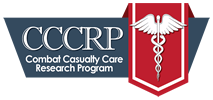Regenerative Medicine & Wound Management
Regenerative Medicine
United States armed forces have seen impressive rates of warfighters surviving from what in the past would probably be considered mortal wounds. This change is in large part due to a combination of state-of-the-art medical technology and practice within and outside theaters of operation along with more effective body armor that protects vital organs. An unintended consequence of the body armor, however, is that many surviving casualties suffer from the long-term effects of traumatic injuries to vital organs and amputated limbs. The Regenerative Medicine Portfolio focuses on innovative regenerative technologies across diverse medical disciplines to provide the capability for the return to duty (RTD) of severely wounded Warfighters using advanced technologies to increase RTD rates vice medical discharges, reduce hospital stays, decrease the number of outpatient visits, and reduce the cost of care in terms of both caregiver workload and total health care costs. This comprehensive focus area encompasses a spectrum of cutting-edge therapies, from stem cell applications and tissue engineering to bioactive scaffolds and growth factor interventions. The overall vision of this portfolio is to fund high-quality medical solutions that will be used across the full range of military operations, from Role 1 to 4, in support of Combat Casualty Care to all warfighters.
Research efforts include:
- Development of solutions to treat damage to a combination of soft tissue, musculoskeletal, vascular, and nervous systems. This includes, but is not limited to, tissue regeneration, vascular repair, regeneration of nerve defects and bone defects, provision of bone defects, treatment of abdomen and pelvic injury, cellular therapies for trauma and ex vivo on-demand blood technologies.
- Identify and develop methods to accelerate healing and promote quality of life.
- Leverage training opportunities to expand regenerative capabilities within the military laboratories.
Current research efforts are funded through the newly formed Armed Forces Institute for Regenerative Medicine (AFIRM), awarded to Wake Forest University. Updated information and opportunities will be posted here: AFIRM Consortium 2024 ![]() (afirm4.org).
(afirm4.org).
Wound Management
The Wound Management Portfolio is designed to address the intricate challenges of composite tissue wound management, particularly in prolonged care environments. This specialized area of research encompasses advanced dressings, smart wound monitoring systems, and essential toolsets tailored to the unique demands of extended field operations. The mission focus extends beyond traditional wound care, recognizing the imperative need for comprehensive solutions in challenging settings. By integrating specialized toolsets, the Portfolio will enhance the ability of military healthcare professionals to navigate the complexities of composite tissue injuries in prolonged care scenarios and ensure a holistic approach to both acute and long-term wound management.
 An official website of the United States government
An official website of the United States government  ) or https:// means you've safely connected to the .mil website. Share sensitive information only on official, secure websites.
) or https:// means you've safely connected to the .mil website. Share sensitive information only on official, secure websites.